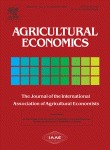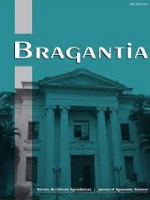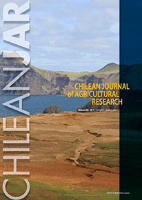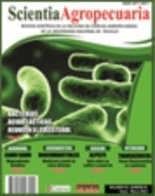
Revista Latinoamericana de la Papa
Scope & Guideline
Unlocking the potential of potatoes in Latin America.
Introduction
Aims and Scopes
- Potato Crop Research:
The journal primarily publishes research related to potato agronomy, including studies on crop productivity, resistance to pests and diseases, and the impact of different agricultural practices on potato yield. - Sustainability in Potato Farming:
There is a significant focus on sustainability, examining factors that affect the long-term viability of potato farming households and the role of livelihood assets in maintaining agricultural sustainability. - Biotechnology and Innovation:
Research exploring the use of biostimulants, growth-promoting microorganisms, and other innovative techniques to enhance potato production is a core area of interest. - Economic and Market Analysis:
The journal also addresses the economic aspects of potato production, including market trends, supply chain dynamics, and the socio-economic implications of potato cultivation in local communities. - Culinary and Cultural Aspects:
There is an emerging interest in the cultural significance of native potatoes, highlighting their role in culinary practices and market innovation.
Trending and Emerging
- Impact of COVID-19 on Agriculture:
The pandemic's effects on the potato sector have prompted research into how COVID-19 has altered production and market dynamics in the Andean region, revealing vulnerabilities and opportunities for resilience. - Native and Indigenous Potato Varieties:
There is a growing recognition of the importance of native potatoes, with studies emphasizing their culinary value and potential for market innovation, which reflects a broader trend towards valuing biodiversity. - Sustainable Practices and Resource Efficiency:
Research focusing on phosphorus use efficiency and the integration of biostimulants indicates a trend towards sustainable agricultural practices aimed at optimizing resource use while maintaining or improving yield.
Declining or Waning
- Traditional Breeding Techniques:
Research centered on traditional breeding methods for developing new potato varieties seems to be less frequent, possibly overshadowed by biotechnological advancements and a focus on genetic resistance. - General Pest Management Strategies:
There has been a noticeable decrease in studies that cover broad pest management strategies, as more specific research on resistance to particular pests, like Tecia solanivora, has gained attention. - Regional Production Challenges:
While challenges in potato production are still discussed, the focus on regional issues appears to be waning, likely due to a shift towards more universal solutions that can be applied across different contexts.
Similar Journals

Sugar Tech
Leading the Way in Sugarcane Innovation and SustainabilitySugar Tech, an esteemed journal published by SPRINGER INDIA, is a leading platform for scholarly research in the field of agronomy and crop science. Established in 2003, the journal has rapidly gained recognition, attaining a solid Q2 ranking in the highly competitive category of Agricultural and Biological Sciences according to the 2023 metrics. With an ISSN of 0972-1525 and an E-ISSN of 0974-0740, Sugar Tech contributes significantly to the dissemination of knowledge related to sugarcane production, processing, and technological advancements, catering to a global audience of researchers, industry professionals, and students. The journal facilitates an open forum for the exchange of innovative ideas and findings, encouraging the advancement of sustainable practices within the sugar industry. With Scopus ranking indicating a percentile of 67th among 406 journals in its category, Sugar Tech serves as an invaluable resource for those dedicated to exploring and addressing challenges faced in the agronomic sector.

AGRICULTURAL ECONOMICS
Innovating agricultural practices through rigorous research.AGRICULTURAL ECONOMICS, published by Wiley, is a premier journal dedicated to advancing the understanding of agricultural economics, with an ISSN of 0169-5150 and an E-ISSN of 1574-0862. This esteemed publication serves as a vital resource for researchers, professionals, and students in the fields of Agronomy and Crop Science, as well as Economics and Econometrics, consistently reflecting its high standing as evidenced by its 2023 Q1 ranking in both categories. With a comprehensive scope spanning from 1986 to 2024, the journal presents rigorous analysis and innovative research that informs policy decisions and enhances agricultural practices globally. Although it does not provide open access options, the rich academic content invites a dedicated readership committed to strengthening the agricultural sector through evidence-based insights. The journal is particularly noted for its impressive Scopus rankings, placing it among the top-tier resources for understanding the complex interplay between economic theory and agricultural development.

Advances in Agriculture
Transforming Agriculture with Open Access InsightsAdvances in Agriculture is a prominent Open Access journal dedicated to the dissemination of high-quality research in the fields of agriculture, agronomy, animal science, food science, and soil science. Published by HINDAWI LTD from the United Kingdom, this journal has made significant strides since its inception in 2014, contributing to the advancement of agricultural knowledge and practices. With an impressive impact factor reflected in its tiered quartile rankings, notably Q2 in Agricultural and Biological Sciences (miscellaneous), Agronomy and Crop Science, and Animal Science and Zoology, it serves as a key platform for innovative research and applied science. The journal aims to provide researchers, professionals, and students with rich access to groundbreaking studies that can help shape sustainable agricultural practices and policies. Emphasizing a global audience, Advances in Agriculture promotes an inclusive dialogue among scholars to tackle contemporary challenges in agriculture, enhancing food security and environmental stewardship worldwide.

BRAGANTIA
Your Gateway to Cutting-Edge Agricultural ResearchBRAGANTIA, published by the Instituto Agronômico, is a distinguished open access journal that has been a vital resource since its inception in 1977. With an ISSN of 0006-8705 and E-ISSN 1678-4499, this journal is recognized for its contributions to the field of Agricultural and Biological Sciences, where it currently holds a respectable Q2 ranking as of 2023. Additionally, BRAGANTIA is indexed in various databases, supporting its impact within Materials Science (Q3 ranking). Positioned in Brazil, the journal promotes the dissemination of high-quality research, aiming to bridge the gap between academia and practical applications in agricultural innovation and sustainability. Researchers, professionals, and students looking to keep abreast of recent advancements and their implications will find BRAGANTIA to be an indispensable platform for sharing and accessing vital agricultural knowledge.

Agriculture-Basel
Exploring Breakthroughs in Crop and Plant ScienceAgriculture-Basel is a prestigious, peer-reviewed journal published by MDPI, specializing in the dynamic fields of agronomy, crop science, food science, and plant science. Established in 2011, this open-access journal serves as a pivotal platform for disseminating innovative research and developments in agricultural practices and technologies. With its impressive impact factor and ranking within the top quartiles in key categories, including Q1 in Agronomy and Crop Science and Q2 in Food Science and Plant Science, the journal has garnered significant attention from the research community. Its current Scopus rankings reflect its influence and importance, with notable positions in agricultural and biological sciences. Aimed at researchers, professionals, and students in the agricultural sector, Agriculture-Basel is committed to fostering a deeper understanding of sustainable practices and advancements in the field. With an emphasis on accessibility, the journal ensures that its valuable content is freely available since its inception, making it a cornerstone resource for all those engaged in contemporary agricultural research and applications.

Chilean Journal of Agricultural Research
Championing open access to vital agricultural research.Chilean Journal of Agricultural Research, published by INST INVESTIGACIONES AGROPECUARIAS - INIA, is a premier academic journal dedicated to the advancement of knowledge in the fields of Agronomy, Crop Science, Animal Science, and Zoology. With an ISSN of 0718-5839, this journal serves as a vital resource for researchers, professionals, and students alike, facilitating the dissemination of impactful research from Chile and around the globe. Classified as a Q2 journal in both Agronomy and Crop Science and Animal Science and Zoology as of 2023, it occupies a significant position in academic rankings, highlighted by its Scopus metrics, which recognize its contributions to the field. The journal operates under an Open Access model, ensuring that valuable research is accessible to a wider audience, thereby promoting innovation and collaboration. With a converged publication timeline from 2008 to 2024, the Chilean Journal of Agricultural Research continues to enhance understanding and foster advancements in agricultural science, thus playing an instrumental role in addressing contemporary challenges in food security and sustainable practices.

PHILIPPINE AGRICULTURAL SCIENTIST
Bridging Research and Practice in Agricultural Sciences.PHILIPPINE AGRICULTURAL SCIENTIST is a pioneering journal published by the University of the Philippines Los Baños, dedicated to advancing the fields of Agronomy, Crop Science, Animal Science, and Biotechnology. With an ISSN of 0031-7454, this esteemed journal provides a vital platform for researchers and practitioners focusing on agricultural innovations and practices in the Philippines and beyond. With a robust history dating back to 1996 and continuing through 2024, the journal operates within the Q4 quartile, reflecting its potential for growth and impactful contributions in its categories. Despite currently being positioned in the lower ranks, it serves as an essential publishing venue for nascent studies and localized research, contributing to the agricultural discourse. The journal fosters a collaborative research environment, encouraging submissions from both emerging scholars and seasoned experts, making it a valuable resource for students, professionals, and researchers engaged in the agricultural sciences. While it currently does not offer open access, it plays a crucial role in disseminating vital knowledge aimed at enhancing agricultural practices in the region.

SPANISH JOURNAL OF AGRICULTURAL RESEARCH
Nurturing Ideas for Enhanced Agricultural ProductivityThe Spanish Journal of Agricultural Research (ISSN: 1695-971X, E-ISSN: 2171-9292), published by the prestigious Consejo Superior Investigaciones Cientificas (CSIC), serves as a vital resource for those engaged in the fields of agronomy and crop science. Established as an Open Access journal since 2003, it aims to foster the dissemination of innovative research and practical applications related to agricultural practices and sustainability. With its Q3 category in Agronomy and Crop Science and a Scopus ranking of #224 out of 406, the journal provides an accessible platform for scholars to share valuable findings that enhance agricultural productivity and environmental stewardship. Covering research from 2006 to 2024, this journal continues to be instrumental for researchers, professionals, and students eager to remain at the forefront of agricultural science advancements.

Bulgarian Journal of Agricultural Science
Advancing Sustainable Agriculture Through ResearchThe Bulgarian Journal of Agricultural Science, with ISSN 1310-0351, is a distinguished scholarly publication dedicated to advancing the field of agricultural and biological sciences. Published by the Scientific Issues National Centre Agrarian Sciences in Bulgaria, this journal serves as a vital platform for researchers, professionals, and students to disseminate significant findings and innovative approaches within the agricultural sector. The journal operates under an Open Access model and has consistently published research from 2008 to 2024, ensuring timely dissemination of knowledge. With a current impact factor that places it in the Q3 quartile in both Agricultural and Biological Sciences and Veterinary categories, it reflects a commitment to quality and relevance in research. Furthermore, the journal is indexed in Scopus, showcasing its global visibility and outreach. The Bulgarian Journal of Agricultural Science is pivotal for those aiming to contribute to sustainable agricultural practices and veterinary advancements, fostering a robust dialogue among scholars and practitioners alike.

Scientia Agropecuaria
Connecting researchers to cultivate impactful agricultural insights.Scientia Agropecuaria, an esteemed journal published by the Universidad Nacional de Trujillo’s Faculty of Agricultural Sciences, is dedicated to advancing research in the fields of Agronomy, Animal Science, and Soil Science. With a rich heritage since its inception, the journal has embraced Open Access since 2010, ensuring global dissemination of knowledge to researchers and practitioners. Hailing from Trujillo, Peru, it plays a vital role in the scientific community, capturing a Q3 ranking across multiple categories in the 2023 category quartiles, which reflects its growing influence, supported by its commendable Scopus percentile rankings. The scope of the journal is to publish original research, reviews, and insights that address critical issues and innovations in agriculture and related fields, making it a key resource for researchers, professionals, and students aiming to stay abreast of cutting-edge developments. As the journal continues its convergence until 2024, it remains an important platform for impactful contributions to the agricultural sciences.